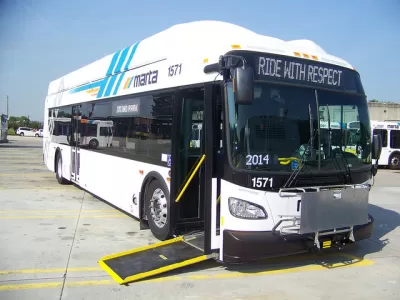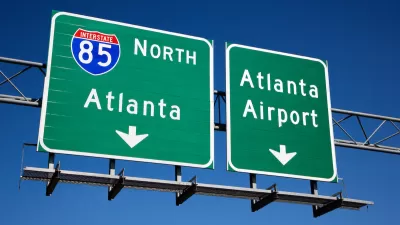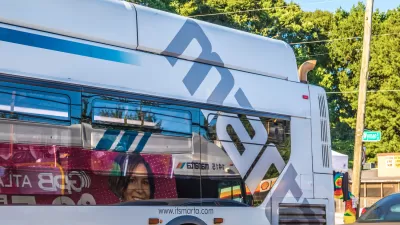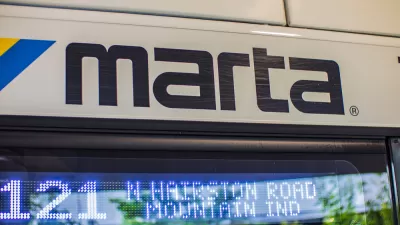The group expressed concerns with changes made to a key segment, which leaves riders with fewer connections to existing transit and does not position the line for future growth.

In an open letter to the city, the Atlanta Downtown Neighborhood Association (ADNA) is calling for a change in approach to Atlanta's first Bus Rapid Transit (BRT) line to prevent wasteful spending. "The ADNA’s preferred route would more swiftly move passengers around the city, connect to existing MARTA rail, and position the BRT system for future growth, they feel."
The letter, published in Urbanize Atlanta, claims that the "Locally Preferred Alternative" route proposed for a section of the BRT line downtown is not what locals want. "Crucially, this new route has three large sections in downtown where it will have to operate in 'shared' traffic lanes in contradiction of BRT standards, slowing service and reducing ridership during peak times" and makes no accommodations for future expansion.
The Association argues that "[w]hen this change to the route’s downtown section was made in 2019, little outreach was done to key stakeholders, such as the Atlanta Downtown Neighborhood Association (ADNA) and the approximately 14,500 (and rapidly growing) downtown residents most directly impacted." The letter also claims that residents were misled about the new route, which "dumps riders in the middle of South Downtown without direct connection to any current or planned rail."
"This current 'western' BRT route also jeopardizes existing plans to bring cycle tracks, wider sidewalks, and outdoor dining to downtown streets as well as upending partially funded plans to restore two-way traffic flow planned along these corridors." With 60 percent of the design completed to date, the letter urges the city "to get this done right and avoid wasting money later in the process."
FULL STORY: Downtown Atlanta neighbors plead to city: 'Save MARTA bus rapid transit'

Alabama: Trump Terminates Settlements for Black Communities Harmed By Raw Sewage
Trump deemed the landmark civil rights agreement “illegal DEI and environmental justice policy.”

Study: Maui’s Plan to Convert Vacation Rentals to Long-Term Housing Could Cause Nearly $1 Billion Economic Loss
The plan would reduce visitor accommodation by 25% resulting in 1,900 jobs lost.

Planetizen Federal Action Tracker
A weekly monitor of how Trump’s orders and actions are impacting planners and planning in America.

Waymo Gets Permission to Map SF’s Market Street
If allowed to operate on the traffic-restricted street, Waymo’s autonomous taxis would have a leg up over ride-hailing competitors — and counter the city’s efforts to grow bike and pedestrian on the thoroughfare.

Parklet Symposium Highlights the Success of Shared Spaces
Parklets got a boost during the Covid-19 pandemic, when the concept was translated to outdoor dining programs that offered restaurants a lifeline during the shutdown.

Federal Homelessness Agency Places Entire Staff on Leave
The U.S. Interagency Council on Homelessness is the only federal agency dedicated to preventing and ending homelessness.
Urban Design for Planners 1: Software Tools
This six-course series explores essential urban design concepts using open source software and equips planners with the tools they need to participate fully in the urban design process.
Planning for Universal Design
Learn the tools for implementing Universal Design in planning regulations.
Caltrans
Smith Gee Studio
Institute for Housing and Urban Development Studies (IHS)
City of Grandview
Harvard GSD Executive Education
Toledo-Lucas County Plan Commissions
Salt Lake City
NYU Wagner Graduate School of Public Service





























